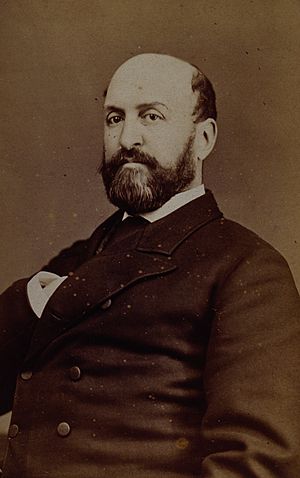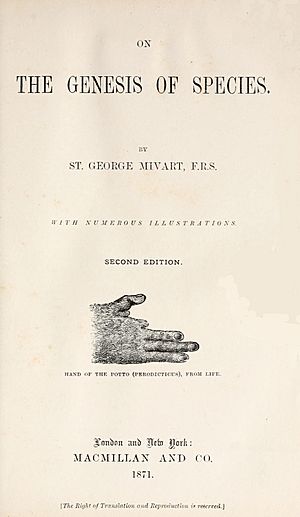St. George Jackson Mivart facts for kids
Quick facts for kids
St. George Jackson Mivart
|
|
|---|---|

Mivart, by Barraud & Jerrard
|
|
| Born | 30 November 1827 London, England
|
| Died | 1 April 1900 (aged 72) London, England
|
St. George Jackson Mivart FRS (born November 30, 1827 – died April 1, 1900) was an English biologist. He is famous for first strongly believing in natural selection. Later, he became one of its biggest critics. Mivart tried to connect the theory of evolution, as explained by Charles Darwin, with the beliefs of the Catholic Church. However, both Darwin and the Church disagreed with him. He believed that God created a soul for humans. He also insisted that evolution could exist alongside the idea of God. This led to disagreements with other evolutionists. His ideas about hell and how science and Catholicism could fit together caused problems with the Church.
Early Life and Education
St. George Jackson Mivart was born in London, England. His parents were Evangelicals, a type of Christian. His father owned a rich hotel called Mivart's Hotel, which is now known as Claridge's.
Mivart started his schooling at Clapham Grammar School. He then went to Harrow School and King's College London. He later became a Catholic. Because of this, he studied at St. Mary's, Oscott from 1844 to 1846. He was confirmed there in 1845. Becoming a Catholic meant he could not attend the University of Oxford. At that time, only members of the Anglican faith could study there. His mother also became Catholic in 1846.
Important Roles and Discoveries
In 1851, Mivart became a lawyer at Lincoln's Inn. But he chose to focus on studying medicine and biology instead. In 1862, he became a professor of zoology at St. Mary's Hospital medical school. Zoology is the study of animals.
He became a member of the Zoological Society of London in 1869. This society studies animals. From 1874 to 1877, he was a Professor of Biology at the Catholic University College, Kensington. He was also vice-president of the Zoological Society twice. He was a member of the Linnean Society from 1862. This society studies natural history. He was its secretary from 1874 to 1880 and vice-president in 1892.
In 1867, he was chosen as a Fellow of the Royal Society. This is a very important honor for scientists. He earned it for his work on the skeletons of primates. Thomas Henry Huxley, another famous scientist, shared Mivart's work with the society. Mivart also joined the Metaphysical Society in 1874. He received special degrees from Pope Pius IX in 1876 and from the University of Louvain in 1884.
His Passing
St. George Jackson Mivart died in London on April 1, 1900. He passed away from diabetes. At first, he could not be buried in a church cemetery. This was because of some of his later ideas. However, a doctor explained that his illness might have affected his thinking.
After his death, his friends and church leaders had a long discussion about his burial. On April 6, 1900, his body was placed in a temporary vault. This was in a part of the cemetery not connected to the church. Later, on January 16, 1904, his body was moved. He was finally buried in St. Mary's Roman Catholic Cemetery in Kensal Green on January 18, 1904.
Lasting Impact
St. George Jackson Mivart's name is remembered in science. A type of lizard is named after him: Emoia mivarti.
 | William Lucy |
 | Charles Hayes |
 | Cleveland Robinson |


